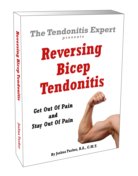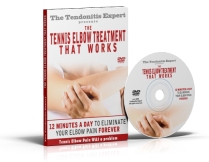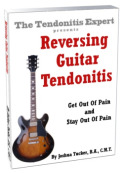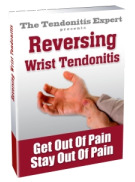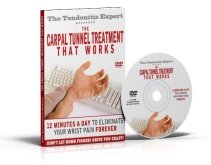Elbow and biceps issues with weightlifting
by Luke
(Indy)
Hello, I am not sure if I necessarily have tennis elbow, but I definitely have some sort of tendinitis in that particular region and have been scouring the internet to try and figure out A. What it is and B. How to properly rehab it. I am 39 years old.
I workout 3 times a week, Usually Mondays and Thursdays are full-body workouts with a focus on hypertrophy (6-12 rep range, then I bump up the weight once I can do 3-4 sets of 12). I do a pretty slow tempo on the negative portion of all exercises and flex the target muscles on the positive portion.
Saturdays are reserved for rotator cuff strengthening exercises (I had a shoulder injury 18 years ago).
1. High-bar squat with going past parallel (3-4 working sets or 6-12 reps)
2. Dumbell bench-press (stretch at bottom, squeeze pecs at top)
3. Weighted pull-ups with palms facing out (25-30 reps, # of sets varies or Lat pull-down (wide grip straight lat bar)
4. Weighted dips with torso angle favoring chest over triceps(25-30 reps)
5. Seated rows (neutral hand position)
6. Overhead presses with false grip or Ab-roller instead of OHP
Anyways, I have a pain that seems to float somewhere in my elbow joint, but I can for sure feel a pain in my right arm right where a phlebotomist would take blood.
Sometimes I swear I feel it radiating up my bicep, and sometimes I feel it on the outside forearm, sometimes even on the inside elbow area.
What I do now for sure though, is that it hurts whenever I try to pick my daughter up from the ground or if I try to do "front-raises" with her. It also hurts right after I put my phone down after talking on it for a few minutes.
If I push on my elbow joint, I can feel the most tenderness near the bicep attachment or on the underside. But what is strange is that when I am typing on the computer, I feel tenderness in both the upper outside forearm AND underneath. When exercising, I feel the most pain in what I think is the biceps/lower arm crease that radiates up.
I had a massage on the elbow tendons and it helped. I also switched to a neutral grip on the pull-ups, and it seems better, but not healed.
Does this sound like tennis elbow? My grip on deadlift and other barbell exercises has always sucked, some sites say to strengthen the grip to get rid of elbow pain, does that make sense?
When I look at my arm musculature in the mirror, I can't help but notice that my triceps are way bigger than my biceps. Could some of these elbow issues that people have be due to muscle imbalances?
I have seen some sites advocating strengthening both the grip and the biceps to alleviate pain. Some other sites want you to do everything with neutral grip (trap-bar deadlift etc.). Some sites say to avoid barbell curls, some say to do hammer curls instead. I am so confused right now, but I really want this nagging pain to go away.
I would appreciate any feedback, to both what I probably have and also what a rehab would consist of. Thank you!
----
Hi Luke.
Tendonitis no matter what you call it or what name you give it, is a dynamic. A dynamic made up of multiple factors all working together to cause pain and problem.
See: What Is Tendonitis?
What you've described doesn't sound exactly like Tennis Elbow, but it certainly sounds like a tendonitis dynamic....and that can look/behave a variety of ways...all similar to what you've described.
See: What Is Tennis Elbow
PT's, and weightliting lore has all sorts of suggestions as to how to avoid or fix tendonitis pain from lifting....but changing your grip doesn't fix anything.
At best it's a work around, an avoidance.
Tendonitis is a Pain Causing Dynamic, meaning, all those factors work together, quickly or slowly, to cause pain or problem.
Changing your grip doesn't fix anything, it doesn't reverse any of those factors. It may allow one to go longer with less pain, but the dynamic is in place, it's going to catch up to you sooner or later.
And even if it takes a long time, the dynamic is still in place and limiting your function.
Because really, it's all about function...or lack thereof.
The mythology around 'strengthening' your grip (or your shoulder cuff, etc) is based on a misunderstanding of 'weakness'.
We're told that if we have pain and problem, we need to 'strengthen' the muscles.
And that would work if the muscles were 'weak'. But they're not weak, they're dysfunctional. Their ability to produce work is limited.
Said another way, it's not like they're lazy and not doing their job and just need a good workout to get stronger. It's more that they are restricted in how much work they can produce....so working as hard as they can, at best they can output 'less' than they should.
How can lifting weights make a crippled muscle stronger?
It can't.
If your car only has three tires on it, will pressing the gas pedal all the way down fix it's speed/maneuverability problem?
Of course it won't. You have to put the fourth tire on and then you're back to good as new.
But PT's and weight lifting magazines and websites assure you that if you just make that three wheeled car go faster it will fix the problem.
So, how do you get muscles stronger (in the context of pain and problem)?
You restore function. And then the muscle can work optimally again.
You hurt because you have multiple dysfunctional muscles.
They're dysfunctional because of:
- too tight muscle and connective tissue
- chronic inflammation process
- lack of nutrition
I recommend you get my Reversing Bicep Tendonitis program.
You have some elements of Tennis Elbow (forearm), but from what you said I suspect your main issue is biceps and pronator teres (and all the connective tissue in and around there).
You said your biceps were smaller. Which makes sense. Either you're just genetically built for small biceps, or your biceps are functioning poorly and thus can't 'build' for a variety of reasons.
----------------------
Please reply using the comment link below. Do not submit a new submission to answer/reply, it's too hard for me to find where it's supposed to go.
And, comments have a 3,000 character limit so you may have to comment twice.
-----------------------

Joshua Tucker, B.A., C.M.T.
The Tendonitis Expert
www.TendonitisExpert.com
Comments for Elbow and biceps issues with weightlifting
|
||
|
||
|
||
|
||
